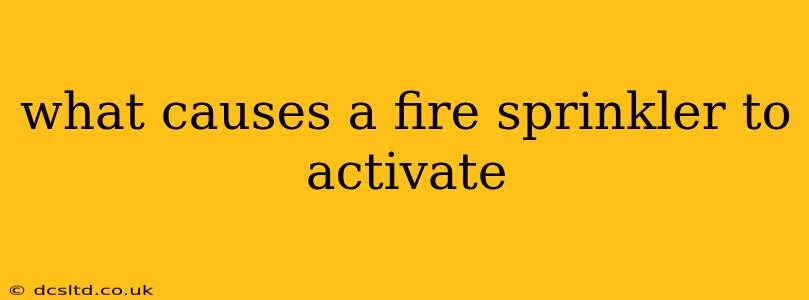Fire sprinklers are life-saving devices designed to suppress and extinguish fires in their early stages, minimizing damage and protecting lives. Understanding how they activate is crucial for building safety and preparedness. This comprehensive guide will explore the mechanisms behind sprinkler activation, addressing common questions and misconceptions.
How Does a Fire Sprinkler Work?
Most modern fire sprinklers utilize a simple yet effective heat-activated mechanism. Each sprinkler head contains a small glass bulb or a fusible link made of a low-melting-point alloy. When the temperature surrounding the sprinkler reaches a critical threshold (typically around 155°F or 68°C, but this varies depending on the sprinkler type and application), the bulb breaks or the link melts. This releases the restraint holding the sprinkler's valve closed, allowing water to flow. The water then disperses through the sprinkler head's nozzle, aiming to douse the nearby flames.
What Temperature Does a Sprinkler Activate?
The activation temperature varies depending on the type of sprinkler. Sprinklers are designed for different applications and environments, with different temperature ratings. Standard response sprinklers are typically designed to activate around 155°F (68°C), suitable for many common fire risks. Other types include:
- High-temperature sprinklers: These activate at higher temperatures, often used in areas where high ambient temperatures are present, such as near ovens or industrial processes.
- Intermediate-temperature sprinklers: These fall between standard and high-temperature sprinklers.
- Low-temperature sprinklers: These activate at lower temperatures, often used in areas with sensitive materials that could be damaged by high temperatures.
It's crucial to remember that the activation temperature is a crucial factor in choosing the correct sprinkler for a given space. Improper sprinkler selection can lead to insufficient fire protection.
Can Smoke Activate a Fire Sprinkler?
No, smoke alone will not activate a fire sprinkler. The activation mechanism relies solely on heat. Smoke detectors, however, are vital components of a comprehensive fire safety system, as they alert occupants to a fire before sprinklers are triggered. They are designed to work in conjunction with the sprinkler system.
Can Water Pressure Activate a Fire Sprinkler?
No, ordinary water pressure changes within the sprinkler system will not activate a fire sprinkler. The system is designed to withstand fluctuations in pressure without accidental triggering. Only the heat-activated mechanism described above will cause water release.
What Causes a False Alarm in a Fire Sprinkler System?
While infrequent, false alarms can occur. The most common causes are:
- Improper installation: Faulty installation can lead to unintended triggering.
- Physical damage: Impacts or tampering with the sprinkler heads can cause premature activation.
- Extreme heat: Very high ambient temperatures in the area around the sprinkler, potentially exceeding the design threshold, can lead to accidental triggering.
- Corrosion: Over time, corrosion can weaken the fusible link or glass bulb, making it more susceptible to premature activation.
Regular inspections and maintenance of the sprinkler system are essential to minimize the risk of false alarms.
What Should I Do if a Fire Sprinkler Activates?
If a fire sprinkler activates, remain calm and follow your building's evacuation plan. Sprinkler activation usually indicates a fire, and immediate evacuation is vital. Report the incident to emergency services and building management as soon as possible.
Understanding how fire sprinklers work and what causes them to activate is paramount for safety. Regular inspections, proper maintenance, and knowledge of your building's emergency procedures are crucial for ensuring your safety and the safety of others.
